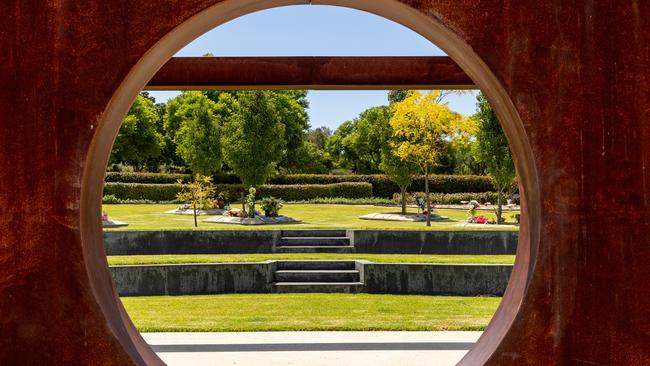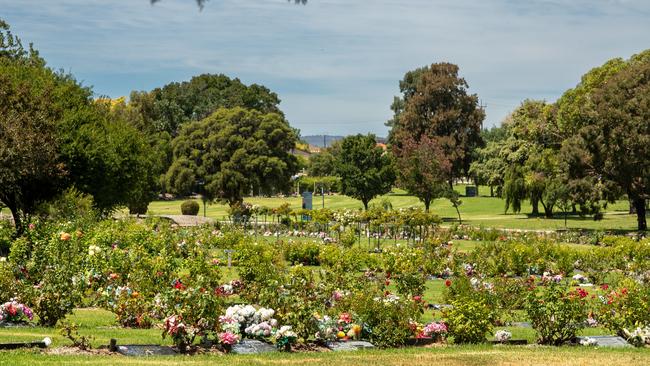CEO of Adelaide Cemeteries Michael Robertson on facing a terminal diagnosis
Michael Robertson deals with death every day. But when told he was terminal, he admits to wanting to keep the diagnosis a secret from his wife and children.

SA Weekend
Don't miss out on the headlines from SA Weekend. Followed categories will be added to My News.
Michael Robertson noticed a lump on his neck a few years back, but delayed getting it tested.
Life was busy in his then role as chief operating officer of Adelaide Cemeteries.
He would get around to it eventually, he told himself. Then, after putting it off for too long, he relented.
The result: Positive.
A biopsy followed which, much to his relief, came back clean.
But the lump persisted and so he continued with more tests. Still, nothing showed up.
“When Covid hit, we put everything on the backburner but when things started to open up again, it wasn’t going down and I started to get more concerned,” Robertson recalls.
This was complicated somewhat by the fact he had just been promoted to the role of chief executive of the organisation, the leading provider of cemetery services in the state.
“That was a role I’d wanted for so long, and time was always limited. But I made the decision to get it checked again,” he says.
Robertson’s doctor sent him to a specialist, who gave him the grim diagnosis in August 2022. While there were still tests to be done, the specialist was confident the condition was Hodgkin’s lymphoma. And, for him, there was no treatment.
“He talked about management plans, not treatment plans, which really hit home,” Robertson remembers.
“It was a case of getting my affairs in order. After 25 years of marriage, I suddenly found telling my wife Jenni that I was terminal the hardest thing I’d have to do.
“I hadn’t even thought of telling my teenage kids, Ella and Callum, which would be harder again.
“I don’t think I’m the sort of person who feels sorry for myself but, if I’m honest, I did have that sense that I was being ripped off.
“I had a wonderful family, had always wanted to reach CEO level and, no sooner had I achieved it, than I was given this terminal sentence.
“I’m a determined, fairly pragmatic person, but I must admit I thought, yeah wouldn’t that be right … I finally get the job and something like this comes along.”

THE GREAT REPRIEVE
For months, Robertson continued to work and even attended conferences in Adelaide and interstate, in the belief that he probably had only a short time to live.
He had even taken Callum to play in the national table tennis championships while sitting on the information.
He and Jenni were preparing to tell their children when the most unlikely of reprieves came through.
Robertson was in Canberra at a conference in October 2022 when he was told via a Zoom meeting that further tests showed he in fact had non-Hodgkin’s lymphoma; still a very serious condition but a treatable one in most cases.
“It was the best news I could imagine,” he recalls.
“I was … expecting to get an update on my time left more than anything, and I was told I was in that 5 per cent where apparently the diagnosis can be wrong.
“It was a complete reprieve, a massive weight off my shoulders, but of course I still had a long way to go before I’d be well again.
“Strangely, non-Hodgkin’s lymphoma is much faster in developing and needs to be treated immediately – and it actually sped up my treatment.
“They always point out that while it’s a very successful treatment, a certain percentage do not survive. But after being given a second chance, I wasn’t even considering that possibility.”
Robertson was rushed into four months of chemotherapy, with sessions every two weeks, before having a short break and continuing with three weeks of radiotherapy.
He went through the usual bouts of illness and nausea but notes that being “always tired” was the overwhelming feeling for him.

ONE BIG LESSON
The experience reinforced Robertson’s long-held belief that death needs to be something openly talked about and not always feared.
It gave him an even greater resolve to create a dialogue with people coming to him in his work life about how to go about their end of life needs and wishes.
But he understands that many people do fear it and they still need their sensitivities addressed.
“But wouldn’t we be better served as a community and individually if we did speak more openly about illness, death and our own end-of-life wishes?” he asks.
“People don’t want to talk about death. They fear death, they fear the contemplation of their own mortality.
“Our Western society is generally far removed from death when you compare us to other cultures where ageing, dying and death are integral parts of life. These cultures embrace the practicalities and details of death.
“We need to talk about death because as a nation we’re facing the difficult challenge of how to meet the end-of-life needs and expectations of an ageing population. There is a significant need to be met that prompts a broader discussion about community expectations around how we will meet that need.
“What we’re trying to do is change the way people deal with death and loss.
“In our business, we’re seeing more celebrations of life. People’s expectations are changing. Not all services are solemn. We also get people requesting more of a celebration. That’s why we’ve built this facility.”
What he’s referring to is the Evergreen Community Precinct, which is set within the largest manicured parklands in Adelaide’s northern suburbs.
It includes five function rooms that can hold 20 to 500 guests, and a cafe with a full-time chef and commercial kitchen. It has AV and live streaming capabilities.

As he walks around Enfield Memorial Park, looking out over flourishing gardens and more than 75 years of gravestones – with a cappuccino in hand, from the cafe that’s open to the public – Robertson contemplates ways of making people feel better about articulating their wishes.
“I understand why people fear talking to someone about a burial or resting place for their loved ones because they don’t want to lose them but I’m trying to make them comfortable that this is a part of life,” he says.
“The way this cemetery is laid out, people can come to the coffee shop and sit and collect their thoughts or talk with family and friends.
“They can stroll around the gardens, and they can sit by the resting place of their family member or friend and just be there.
“Instead of being off limits and a place to fear, we’re trying to make it a place where people can be comfortable and find some solace.”
Perhaps the first step on the journey of dealing with life and death, and end of life, is as simple as strolling around the park grounds, reading a headstone or just sitting on a bench with a coffee.
Robertson understands it won’t be easy for everyone, but it’s a good, and beautiful, place to start.




